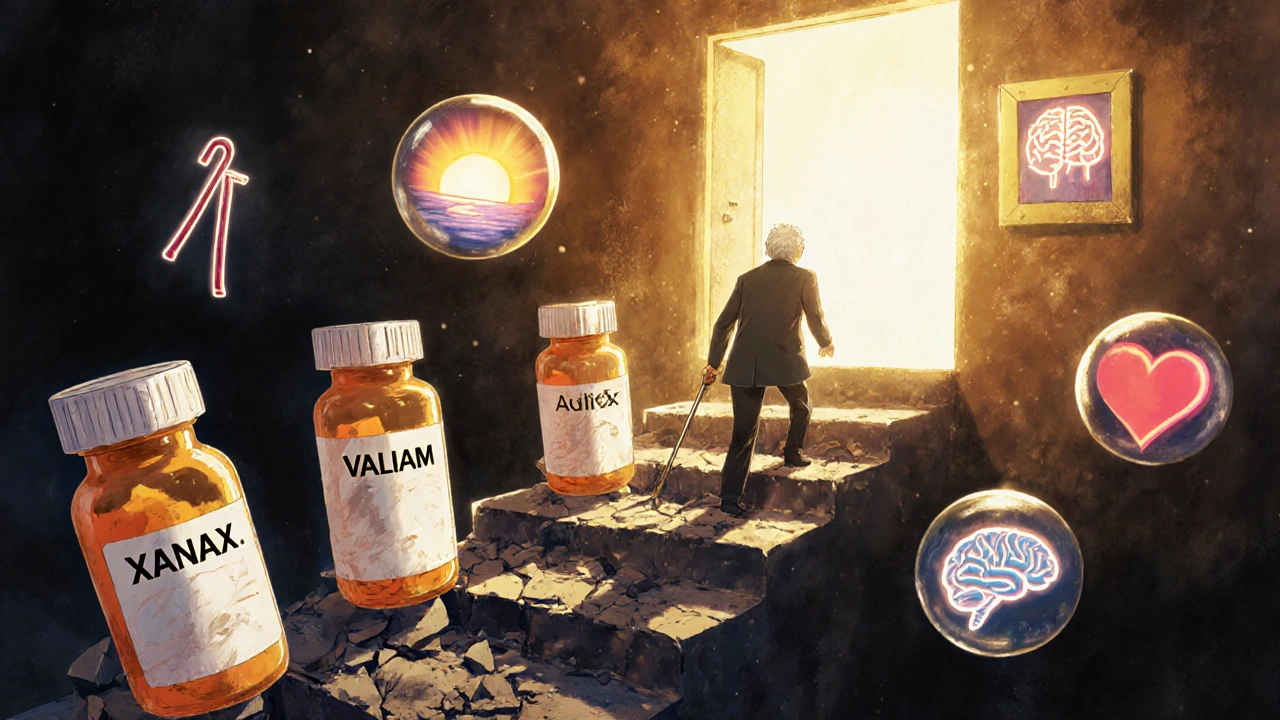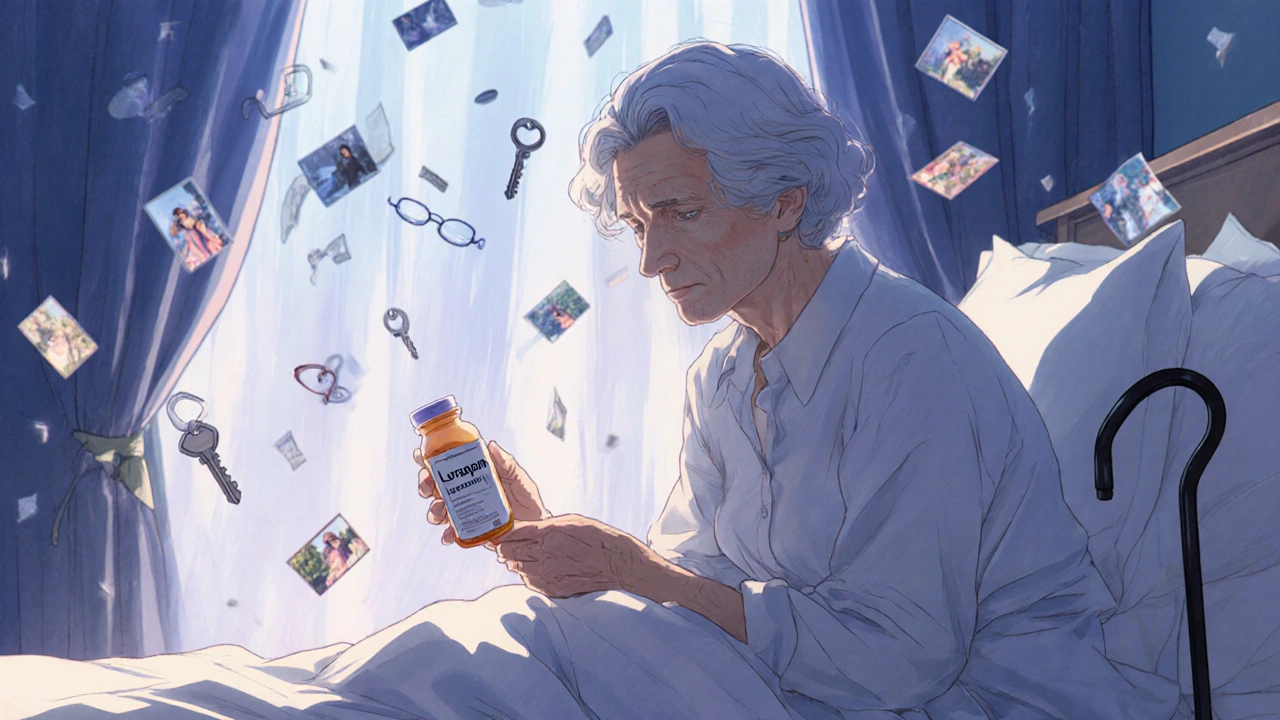More than 8.9% of seniors in the U.S. are prescribed benzodiazepines like Xanax, Valium, or Ativan for anxiety or insomnia. Many believe these medications are safe because a doctor prescribed them. But for older adults, these drugs carry hidden dangers that can change their lives in ways no one expects.
Why Benzodiazepines Are Riskier for Seniors
Benzodiazepines work by boosting GABA, a calming neurotransmitter in the brain. That’s why they help with panic attacks or short-term insomnia. But as we age, our bodies change. The liver processes drugs slower. The brain becomes more sensitive. Even small doses can cause big problems.
Older adults are far more likely to fall after taking benzodiazepines. Studies show a 50% higher risk of hip fractures. That’s not just a scare tactic - it’s a medical reality. One fall can lead to surgery, hospitalization, and loss of independence. And it’s not just falls. These drugs slow reaction times so much that driving becomes as dangerous as driving with a blood alcohol level of 0.05% to 0.079%. That’s legally impaired in most places.
Memory problems are another silent killer. Benzodiazepines cause anterograde amnesia - meaning you can’t form new memories while on them. For seniors, this isn’t just forgetting where you put your keys. It’s forgetting conversations, appointments, or even how to take other medications. A 2023 meta-analysis found that long-term use increases Alzheimer’s risk by up to 84% if taken for more than six months. The longer you take them, and the higher the dose, the worse the risk.
The Myth of Short-Term Use
Many doctors still prescribe benzodiazepines for just a few weeks. Patients think they’re safe because it’s temporary. But here’s the truth: even short-term use can stick. Rebound anxiety and insomnia often hit harder after stopping. Many seniors end up taking them longer than planned - not because they want to, but because they can’t sleep or stay calm without them.
And here’s what most people don’t know: the effects don’t vanish when you stop. A study tracking seniors who quit benzodiazepines found cognitive decline lasted at least three months after stopping. Some never fully recover. That’s not a side effect - it’s a lasting change.
What the Experts Say
The American Geriatrics Society has listed benzodiazepines as potentially inappropriate medications for older adults since 2012 - and they made it even stronger in their 2024 update. Their Beers Criteria says: avoid them unless absolutely necessary. The FDA added new warnings to all benzodiazepine labels in April 2024, specifically calling out dementia risk in seniors.
Dr. Sharon Inouye from Harvard calls them “among the most dangerous medications for older adults.” Dr. Michael Steinman from UCSF says even short-term use carries risks most doctors underestimate. And the Substance Abuse and Mental Health Services Administration (SAMHSA) confirmed in 2025 that these drugs should not be first-line treatment for seniors.
It’s not just doctors. On patient forums, 85% of negative reviews mention feeling “constantly foggy.” Sixty-three percent report increased falls. Seventy-eight percent say stopping was extremely hard. The average patient rating for benzodiazepines in seniors? 5.2 out of 10.

Safer Alternatives for Anxiety and Insomnia
There are better options - and they don’t come with a risk of falling, forgetting, or fading mental clarity.
- Cognitive Behavioral Therapy for Insomnia (CBT-I): This is the gold standard. Studies show 70-80% of seniors improve sleep quality with CBT-I - without drugs. Medicare now covers it since 2022, but only 12% of eligible seniors use it. Why? Lack of access. But it’s available through telehealth and community health centers.
- SSRIs and SNRIs: Medications like sertraline (Zoloft) or venlafaxine (Effexor) are first-line for anxiety in older adults. They take 4-6 weeks to work, but they don’t cause dizziness, memory loss, or addiction. They’re safer for long-term use.
- Ramelteon: This melatonin receptor agonist helps with falling asleep. It’s not strong for staying asleep, but it has almost no risk of dependence or cognitive side effects. It’s a much better choice than diphenhydramine (Benadryl), which is an anticholinergic and raises dementia risk.
- Non-drug strategies: Regular walking, sunlight exposure in the morning, cutting caffeine after noon, and a cool, dark bedroom can dramatically improve sleep. For anxiety, mindfulness, breathing exercises, and social connection reduce symptoms without a pill.
One 78-year-old woman in Melbourne stopped her daily lorazepam after her pharmacist flagged the Beers Criteria. She started CBT-I and began walking every morning. Six months later, she sleeps through the night, hasn’t fallen once, and says she feels “like herself again.”
How to Safely Stop Taking Benzodiazepines
Quitting cold turkey is dangerous. Withdrawal can cause seizures, severe anxiety, or hallucinations. But tapering slowly works.
The American Society of Addiction Medicine recommends:
- Reduce the dose by 5-10% every 1-2 weeks.
- Use a long-acting benzodiazepine like diazepam for tapering if you’re on a short-acting one - it makes withdrawal smoother.
- Combine tapering with CBT for anxiety or insomnia. This boosts success rates from 35% to 65%.
- Involve a caregiver. Family members can help track symptoms and remind you to stick to the plan.
- Document everything. Keep a journal of sleep, mood, and energy levels. This helps your doctor adjust the plan.
Some people need 6-12 months to fully taper. That’s okay. Progress is slower, but safety is worth it.

What to Do If You’re Still Taking Them
If you or a loved one is on a benzodiazepine right now, don’t panic. But do take action.
- Ask your doctor: “Is this still necessary? Are there safer options?”
- Check if you’re on a long-acting one like diazepam or clonazepam - those carry the highest dementia risk.
- Look up the Beers Criteria. It’s free online. You’re entitled to know the risks.
- Join a support group. The Benzodiazepine Information Coalition has over 12,500 members. Many have successfully tapered and are now off these drugs.
- Don’t drink alcohol while taking them. The combination can stop your breathing.
Prescriptions for benzodiazepines in seniors have dropped 18% since 2015. That’s progress. But 3.2 million elderly Americans are still on them. Most don’t know the real risks. You can change that - for yourself or someone you love.
Final Thought
Benzodiazepines aren’t evil drugs. They help in emergencies - like a severe panic attack or before surgery. But for daily anxiety or insomnia in older adults? They’re a Band-Aid on a broken bone. The risks are real. The alternatives work better. And the longer you wait to act, the harder it gets to reverse the damage.
It’s not about giving up comfort. It’s about choosing safety. About keeping your balance, your memory, your independence. That’s worth more than a quick fix.
Are benzodiazepines ever safe for seniors?
Benzodiazepines may be appropriate in rare, short-term situations - like severe anxiety that doesn’t respond to other treatments, or during a medical procedure. But they should never be used daily for insomnia or chronic anxiety in older adults. The American Geriatrics Society and FDA agree: the risks almost always outweigh the benefits for long-term use.
Can benzodiazepines cause dementia?
Yes. Multiple large studies, including one from French and Canadian researchers published in 2023, show that seniors taking benzodiazepines for more than six months have an 84% higher risk of developing Alzheimer’s disease. The risk rises with longer use and higher doses. Long-acting benzodiazepines like diazepam carry the highest risk. This isn’t just a correlation - it’s a proven link.
What’s the safest sleep aid for elderly people?
The safest option is cognitive behavioral therapy for insomnia (CBT-I). It’s non-drug, effective, and long-lasting. If medication is needed, ramelteon is a low-risk melatonin-based option. Avoid diphenhydramine (Benadryl), doxylamine, or other anticholinergics - they increase dementia risk. SSRIs like sertraline can also help with sleep if anxiety is the root cause.
How long does it take to taper off benzodiazepines safely?
For most seniors, tapering takes 8 to 16 weeks, reducing the dose by 5-10% every 1-2 weeks. For those on high doses or long-term use, it may take 6 to 12 months. The key is going slow. Rushing increases withdrawal risk. Working with a doctor and using CBT improves success dramatically.
Why do doctors still prescribe benzodiazepines to seniors?
Some doctors prescribe them out of habit, lack of training in alternatives, or pressure from patients who want quick relief. Many seniors don’t know the risks, so they don’t question it. But awareness is growing. Medicare now covers CBT-I, and new guidelines are pushing for deprescribing. The tide is turning - but change takes time.
What should I do if my doctor won’t help me stop?
Ask for a referral to a geriatrician or a pharmacist specializing in medication reviews. Many hospitals have deprescribing clinics. You can also bring printed copies of the Beers Criteria or the FDA’s 2024 warning letter to your appointment. If you’re still blocked, contact the Benzodiazepine Information Coalition - they offer free guidance and can help you find supportive providers.


 Medications
Medications
Rachel Wusowicz
November 15, 2025 AT 09:05They’re not just prescribing pills-they’re prescribing slow-motion dementia… and nobody’s talking about the pharmaceutical lobby’s behind-the-scenes push to keep these on the shelf. I’ve seen it: doctors get free lunches, reps show up with ‘educational materials’ that look like medical journals but are just ad copy… and then boom-Grandma’s on lorazepam for ‘anxiety’ after a bad dream. It’s not medicine. It’s corporate manipulation wrapped in a white coat. And don’t even get me started on how the FDA’s ‘warnings’ are buried in 47-page PDFs no one reads…
Daniel Stewart
November 16, 2025 AT 08:05There’s a deeper truth here, isn’t there? We’ve outsourced our suffering to chemistry. We don’t want to sit with grief, loneliness, or the quiet terror of aging-so we numb it. Benzodiazepines aren’t the villain; they’re the symptom of a culture that fears stillness. The real alternative isn’t CBT-I or ramelteon… it’s community. It’s being held. It’s someone sitting with you in the dark without trying to fix it. But we’ve forgotten how to do that. So we take pills instead.
Deepak Mishra
November 16, 2025 AT 19:43OMG YES!! I’m from India and my auntie was on Xanax for 3 years!! She forgot my birthday, fell in the bathroom, and now she’s on 7 meds!! I cried when I read this!! 😭😭😭 We need to stop this!! My cousin’s doctor even said ‘it’s fine’ but NOOOO it’s NOT fine!! Please share this with everyone!! 🙏🙏🙏
Diane Tomaszewski
November 18, 2025 AT 12:45I’m 72 and was on Ativan for insomnia. My daughter found this article and made me talk to my doctor. We switched to CBT-I. I didn’t believe it would work. But after three months, I sleep better than I have in 20 years. No fog. No dizziness. Just peace. It’s not magic. It’s just better.
Dan Angles
November 18, 2025 AT 14:56This is a meticulously researched and critically important contribution to geriatric pharmacology. The evidence presented aligns unequivocally with the latest iterations of the Beers Criteria and the FDA’s updated labeling requirements. I commend the author for not only identifying the clinical risks but also for providing actionable, evidence-based alternatives grounded in real-world accessibility. Healthcare systems must prioritize deprescribing protocols and integrate non-pharmacological interventions as standard of care, not afterthoughts.
David Rooksby
November 19, 2025 AT 16:03Okay, so let’s cut through the BS-doctors are lazy. They don’t want to spend 45 minutes talking to an old person about sleep hygiene or breathing exercises. They want to write a script, collect the co-pay, and move on. And the patients? They’re scared. They’re tired. They’re lonely. So they take the pill because it’s easier than fighting the system. But here’s the kicker-most of these doctors never even read the 2024 FDA warning. They got a reminder email from their EHR that said ‘check Beers Criteria’ and clicked ‘done.’ That’s not medicine. That’s checkbox healthcare. And we’re paying for it-in falls, in memory loss, in dignity.
Melanie Taylor
November 20, 2025 AT 11:42This made me cry 😢 My mom took Valium for 8 years. She didn’t even know it was making her forget my name. We found this article after she fell and broke her hip. Now she’s off it, doing yoga, and says she feels ‘lighter.’ I wish we’d known sooner… 🙏❤️ Please share this with your elders. It could save them.
Teresa Smith
November 20, 2025 AT 18:03If you or someone you love is on benzodiazepines, this is not a suggestion-it’s a call to action. You are not being dramatic. You are not overreacting. You are protecting a life. The data is clear, the guidelines are unequivocal, and the alternatives exist. Start by printing the Beers Criteria. Schedule a medication review with your pharmacist. Bring a loved one to your appointment. Document every change. This isn’t about fear. It’s about agency. And you deserve to age with clarity, not chemical fog.